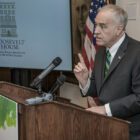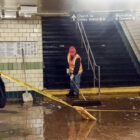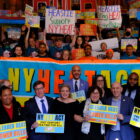CITY VIEWS: OPINIONS and ANALYSIS
Opinion: Why We’re Getting Arrested at Citibank in Tribeca
Alec Connon |
“For years, Citi has refused to confront the issue of its fossil fuel business. And so, we are there, outside the bank’s headquarters, blocking the doors, being led away in handcuffs in the desperate hope that our acts may trigger Citi’s leadership to finally start treating global heating like the existential threat it is.”














